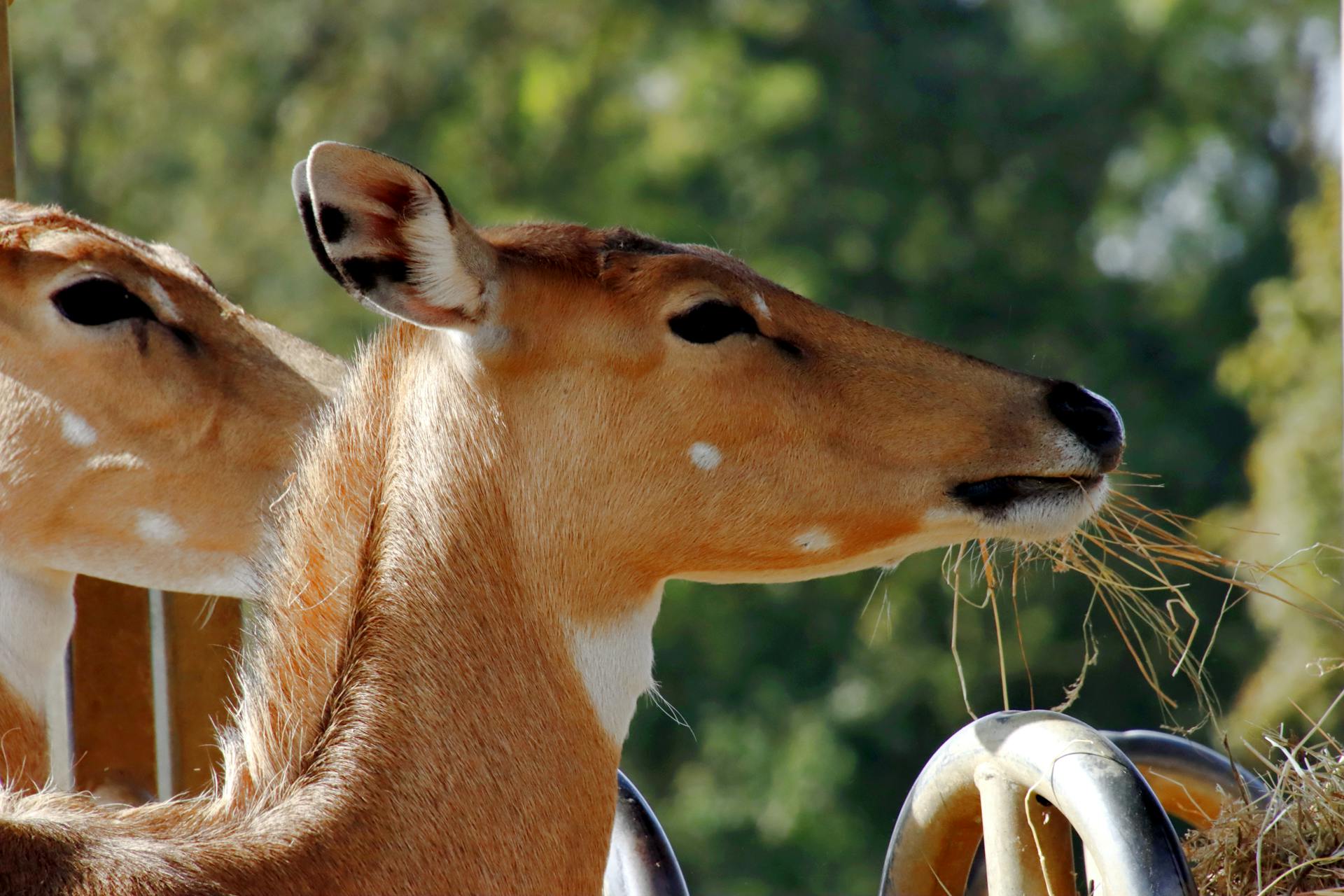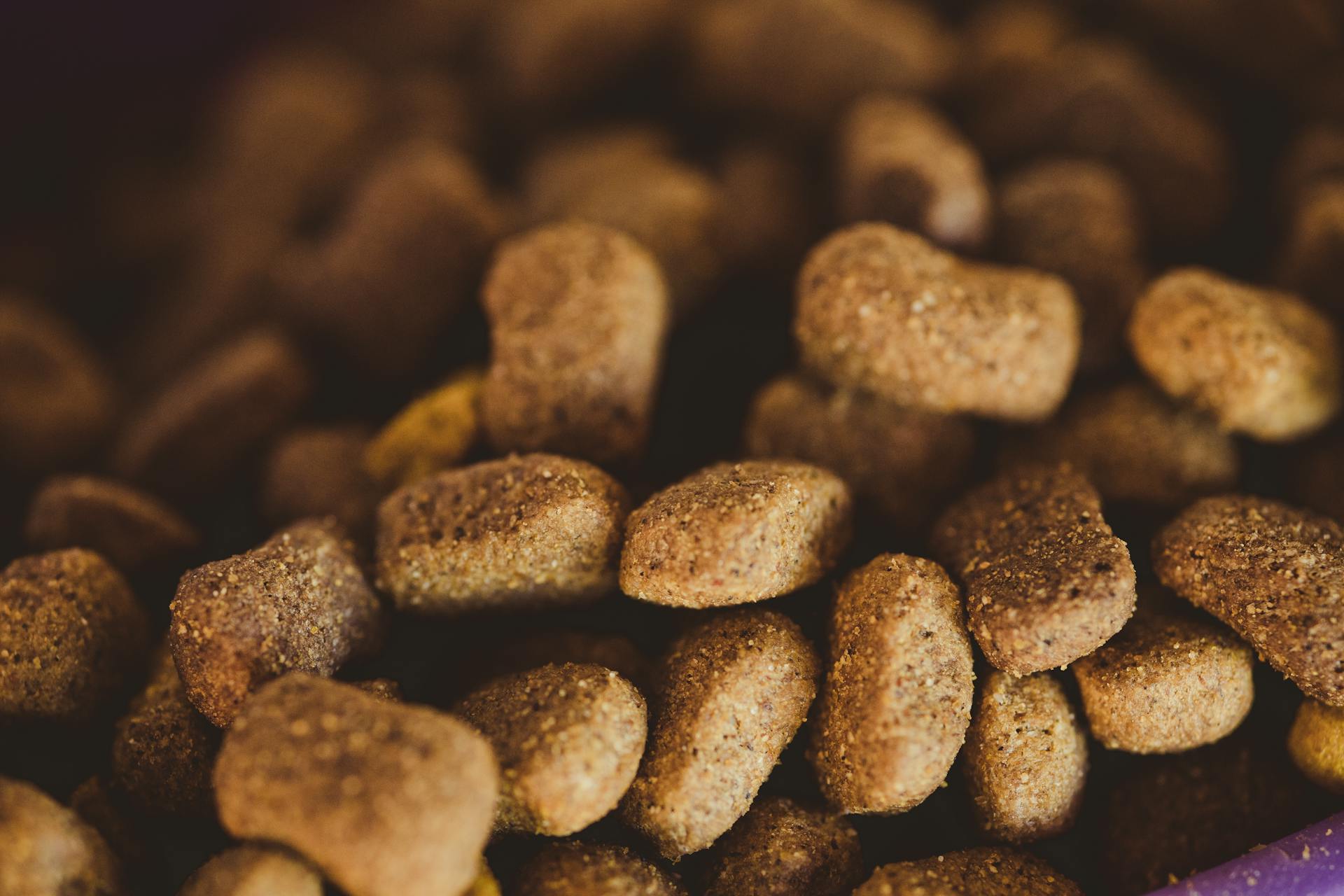
Dogs eating grass can be a frustrating and puzzling behavior for many pet owners. According to research, dogs may eat grass due to a lack of fiber in their diet.
If you're looking for a supplement to stop your dog from eating grass, there are several effective alternatives to consider. One option is adding psyllium husk to your dog's meals, as it can help increase their fiber intake.
Psyllium husk is a natural and non-toxic fiber supplement that can be easily incorporated into your dog's diet. It's available in powder or capsule form and can be added to your dog's food or given as a treat.
By adding psyllium husk to your dog's meals, you can help reduce their grass-eating behavior and promote a healthier digestive system.
Why Do Dogs Eat Grass?
Dogs may eat grass for several reasons, but experts don't have a clear understanding of why.
Some experts agree that grass-eating is normal canine behavior and doesn't usually cause problems.
A lack of fiber in your dog's diet can cause them to eat grass, making it harder for them to pass stool.
Your veterinarian can recommend a more fibrous, nutrient-rich diet to help cut down on grass eating.
Dogs might crave grass because their diet has changed significantly from what it was thousands of years ago.
Some dogs enjoy the flavor and texture of grass, and it's not uncommon for them to prefer it.
Occasional grass consumption is generally considered safe for dogs as long as the grass is free from pesticides and toxins.
Alternatives for Dogs
Dogs may never completely stop eating grass, as it's a natural behavior for them. However, with some adjustments to their diet, you can slow or stop this behavior.
There are several diet changes you can make to help curb your dog's grass-eating habits. Training and enrichment activities can also be effective alternatives to eating grass for dogs.
By making these adjustments, you can reduce your dog's obsessive consumption of grass.
Benefits of Fiber
Fiber is essential for maintaining a healthy digestive system in dogs, promoting solid stools, aiding in nutrient absorption, and helping regulate blood sugar levels.
A good source of fiber for dogs is broccoli sprouts, which can be added to their meals for digestive benefits.
Adding fiber to your dog's diet can support gut health and provide digestive benefits similar to grass consumption.
Pureed sweet potatoes and pureed pumpkin are also great sources of fiber that can be easily incorporated into your dog's meals.
Here are some natural sources of fiber for dogs:
- Broccoli sprouts
- Homemade vegetable blends
- Pureed sweet potatoes
- Pureed pumpkin
- Chia seeds
- Hemp seeds
If you're looking to add more fiber to your dog's diet, consider consulting with your veterinarian for professional recommendations on the best sources and amounts to include.
Alternatives for Dogs
If you're looking for alternatives to your dog eating grass, there are some great options to consider.
Probiotics can be a game-changer for dogs with digestive issues. They support the balance of gut flora, aid in digestion, and even strengthen the immune system.
If you're interested in trying probiotics, there are several products on the market that you can consider, such as Gussy's Gut, Adored Beast Apothecary Gut Soothe, and Adored Beast Apothecary Fido's Flora.
A bag of Gussy's Gut can last more than two months with three large dogs, making it a cost-effective option.
Here are some popular probiotic products for dogs:
- Gussy's Gut
- Adored Beast Apothecary Gut Soothe
- Adored Beast Apothecary Fido's Flora
- Earth Buddy Pet Colostrum
- Real Mushroom's Daily Dawg
If you're looking for a supplement specifically designed to reduce grass eating, Pet Releaf offers two products: Postbiotic Proprietary Blend and Digestive Releaf Edibites.
Stopping Dog from Eating
Stopping your dog from eating grass can be a challenge, but it's not impossible. Fortunately, nibbling on grass every once in a while won't harm your pet.
If your dog's diet doesn't contain enough fiber, they might be eating grass to make passing stool easy. Switching to a more fibrous, nutrient-rich diet might cut down on grass eating.
To eliminate grass eating, you can try changing your dog's food, keeping them engaged while they're out for a walk, and keeping them on a leash or harness.
Deter Dogs from Eating
Fortunately, nibbling on grass every once in a while won't harm your pet, but it's always a good idea to be aware of potential risks like pesticides or intestinal parasites.
You can verbally ask your dog to stop eating grass by teaching them the 'leave it' cue, although this probably won't stop them from going back to it later.
Keep your dog on a leash or harness when you go out together to keep them close to you and away from the grass.
Dogs may eat grass for several reasons, but experts don't have a clear understanding of why, and it's normal canine behavior.
To eliminate grass eating, you can try changing your dog's food, keeping them engaged while on a walk, and offering an alternative to eating grass, such as a valuable treat or a favorite toy.
Playing fetch or tug-of-war can help your dog burn off energy and (hopefully) forget about that tasty grass.
Unless your dog has a health issue or the grass they're eating has pesticides in it, there's likely not much of a threat to consider, but nobody likes having their pet come home and throw up a chunk of wet grass on the carpet.
Behavioral Conditions
Dogs with behavioral issues like anxiety, depression, and compulsive disorders may develop pica, leading them to eat grass frantically, especially when stressed.
If your dog is consuming grass due to behavioral issues, it's essential to address the underlying problem.
Your veterinarian can help identify the root cause of the behavior and provide guidance on how to address it.
They may also refer you to an animal behavior specialist if needed.
In some cases, addressing the behavioral issue can stop the dog from eating grass altogether.
Health Risks and Precautions
Nibbling on grass every once in a while won't harm your pet, but many lawns are treated with pesticides, which can be toxic to dogs.
Some lawns are chemical-free, but your dog may still be swallowing intestinal parasites from feces left behind by other animals along with that clump of grass.
If your dog is eating grass, it's essential to ensure their yard is free from pesticides and other hazards.
Nutrient Deficiency in Their Diet

If your dog is eating grass regularly, it could be a sign of a nutrient or mineral deficiency in their diet. This is less likely if they're eating a high-quality, well-balanced diet.
A diet low in fiber can cause your dog to eat grass to make passing stool easier. You should talk to your vet about switching to a more fibrous, nutrient-rich diet if you notice this behavior.
Domestication has altered a dog's diet significantly from what it was thousands of years ago. This means they might crave grass as a digestive aid.
Some dogs eat grass simply because they like the flavor and/or texture of it. Dogs do have their own preferences when it comes to taste, and for some, grass is a top choice.
Will Eating Grass Harm Dogs?
Eating grass is a common behavior in dogs, and nibbling on it every once in a while won't harm your pet.
Many lawns are treated with pesticides, which can be toxic to dogs. This is a concern because your dog may ingest those chemicals when eating grass.
Fortunately, nibbling on grass in a chemical-free yard is unlikely to cause problems. However, your dog may still swallow intestinal parasites from feces left behind by other animals.
Experts agree that grass-eating is normal canine behavior and usually doesn't cause problems.
For more insights, see: Can Eating Grass Cause Diarrhea in Dogs
Know When to Call a Vet
If you notice a sudden increase in grazing incidence in your dog, it may be a sign that they're sick or missing vital nutrients.
Pay attention to your dog's activities and discuss them with your vet if necessary.
Contact your vet if you're worried about your dog's grass-eating or you notice any signs of illness.
Some signs of illness in dogs that may warrant a vet visit include:
- Behavioral problems
- Changes in appetite or water intake
- Changes in stool or urine output
- Changes in energy level or activity
If you're unsure about your dog's behavior or health, it's always better to err on the side of caution and consult with your vet.
Frequently Asked Questions
What vitamin is my dog lacking if he eats grass?
Your dog may be lacking Vitamin C or Vitamin D if they're eating grass, as these are common nutritional deficiencies associated with pica behavior
Will probiotics help my dog not eat grass?
Probiotics may help reduce your dog's grass-eating behavior by promoting balanced gut health. Adding probiotics to your dog's diet is worth considering if you suspect digestive issues are behind the grass eating.
What to do if your dog is obsessively eating grass?
If your dog is obsessively eating grass, consult a veterinarian to rule out underlying medical issues. They can help determine the cause and provide the necessary treatment
Sources
- https://peterdobias.com/blogs/blog/45013253-is-there-something-wrong-when-dogs-eat-grass
- https://www.rd.com/article/why-dogs-eat-grass/
- https://www.thesprucepets.com/why-puppies-eat-grass-2804594
- https://petreleaf.com/blog/is-there-a-supplement-to-stop-dogs-from-eating-grass
- https://keepthetailwagging.com/how-to-stop-your-dog-from-eating-grass/
Featured Images: pexels.com


